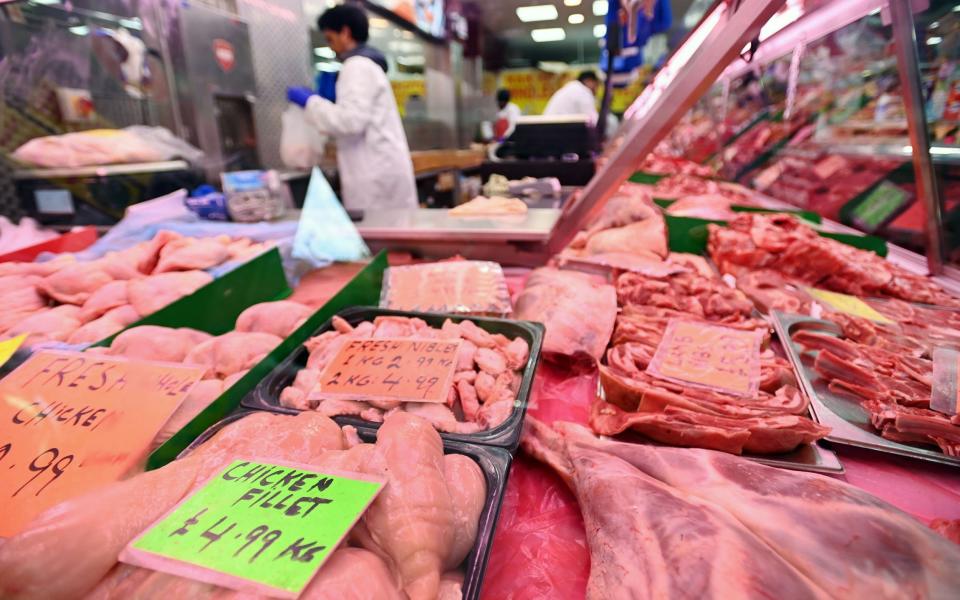Meat tax on the table in move to encourage sustainable eating

British shoppers should be hit with higher prices on meat to help the environment, according to suggestions for a tax on “high-carbon foods” drawn up for the Government.
In a move that replicates the rollout of a “sugar tax” three years ago, the paper explored a levy on red meat and dairy to “help everyone eat more sustainably”.
The suggestion was included in a document published by the Business Department’s Behavioural Insights Unit, also known as the Nudge Unit, on Wednesday morning before being removed from the Government’s website shortly afterwards.
A two-pronged approach would also include “increasing the relative availability of plant-based food”, Whitehall officials said.
Children could be provided “sustainable defaults” in schools, and the public encouraged to use vegan recipes when they buy pots and pans.
University students and those moving away from home for the first time may be offered cooking classes that avoid beef and other so-called high-carbon foods.
The document also calls for carbon taxes on flying and says business flights should be seen as an "immoral indulgence".
A Government spokesman said that it was a research paper and not official policy.
The paper offered a number of options for introducing a levy on meat. A “producer - or retailer-facing tax” was proposed more broadly on high-carbon foods.
Alternatively, beef and sheep farmers and milk producers could be targeted. “Effort to win ‘hearts and minds’ may be better spent building public support for bold policy, such as a producer-facing carbon tax on ruminant products,” the paper said.
But farming and green groups both warned that such a tax could penalise British farmers by leading to more imports of higher carbon meat or even encouraging lower animal welfare standards.
James Rebanks, a sheep and dairy farmer and prize-winning author who has written about sustainable farming, said: “A meat tax is a massively stupid idea.”
“Processed foods are what we should be taxing to ensure we eat real food stuffs that are healthiest for us.”
He added: “It is about welfare standards, trade policies and regulating properly in line with our ethics, not some tax stunt that penalises my farm when it isn’t a problem.”
Hannah Dillon, the head of campaign at Zero Carbon, which advocates for carbon taxes, also suggested a meat levy on British producers would be a blunt instrument.
“Unless we ensure that domestic environmental and animal welfare standards, including carbon prices, are maintained at the border, domestic producers may be subjected to competition from environmentally-damaging, low-welfare food imports,” she said. “These are not good for people or planet.”
Stuart Roberts, deputy president of the National Farmers Union, said the paper “fails to consider the potential impact of penalising local, sustainable meat production whilst allowing in meat imports that are not produced to the same sustainability and environmental standards”.
Kevin Hollinrake, Conservative MP for Thirsk and Malton, said: “A meat and dairy tax … I would be very concerned. The communities I represent depend on livestock farming. And the countryside itself is the way it looks today is dependent on those farmers.
“Most livestock farmers, most hill farmers are break-even at best. You start putting taxes on them, and they are out of business ... it will not only hit farming, it will devastate communities.”
The Nudge Unit was instrumental in introducing the sugar tax in 2018 and in formulating the Government’s initial response to Covid.
Some £336m was raised in the 2020 fiscal year from the sugar levy though ministers have not said where and how it is being spent.
Christopher Price, chief executive of the Rare Breeds Survival Trust that includes Prince Charles among its patrons, said: “While the desire to encourage people to eat less meat overall may be understandable, a meat tax is the wrong way to go about it. It’s too much of a blunt instrument.”
He added: “We need to avoid anything that could threaten the massively important role grazing livestock play in managing many of our most valued habitats and landscapes.”
“It would be awful if some badly thought through initiative aimed at addressing the climate crisis were to end up worsening the crisis in the natural environment”
A government spokesman said: “This was an academic research paper, not government policy. We have no plans whatsoever to dictate consumer behaviour in this way. For that reason, our Net Zero Strategy published yesterday contained no such plans.”

 Yahoo Finance
Yahoo Finance 